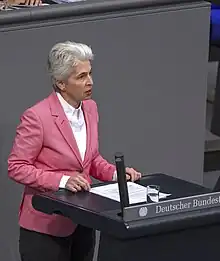Marie-Agnes Strack-Zimmermann
Marie-Agnes Strack-Zimmermann (née Jahn, born 10 March 1958) is a German politician of the Free Democratic Party (FDP) who has been serving as a member of the Bundestag from the state of North Rhine-Westphalia since 2017.[1]
Marie-Agnes Strack-Zimmermann | |
|---|---|
 Strack-Zimmermann in 2019 | |
| Deputy Leader of the Free Democratic Party | |
| In office 8 December 2013 – 26 April 2019 | |
| Leader | Christian Lindner |
| Preceded by | Holger Zastrow |
| Succeeded by | Nicola Beer |
| Member of the Bundestag for North Rhine-Westphalia | |
| Assumed office 24 October 2017 | |
| Constituency | Free Democratic Party List |
| Personal details | |
| Born | Marie-Agnes Jahn 10 March 1958 Düsseldorf, West Germany (now Germany) |
| Political party | Free Democratic Party |
| Children | 3 |
| Alma mater | Ludwig Maximilian University of Munich |
Early life and career
Strack-Zimmermann studied journalism, political science and German language and literature at the Ludwig Maximilian University of Munich (LMU) and graduated with a Master of Arts degree. In 1986, she received her doctorate at the LMU with a thesis entitled Bilder aus Amerika: eine zeitungswissenschaftliche Studie über die USA-Berichterstattung im Zweiten Deutschen Fernsehen (ZDF) (Images from America: a newspaper science study on US reporting on ZDF).
From 1988 to 2008 Strack-Zimmermann worked for the medium-sized Nuremberg youth book publisher Tessloff. Later she was a freelance publishing house representative.
Political career
Career in local politics
Strack-Zimmermann was a member of the Düsseldorf city council from 2004 to 2023.[2] From 2008 until 2014, she served as deputy mayor of Düsseldorf, alongside mayor Dirk Elbers.
Deputy Chair of the FDP, 2013–2019
Following the election of Christian Lindner as chairman of the FDP in 2013, Strack-Zimmermann became one of his deputies. She served as part of the party's leadership until 2019, when she was succeeded by Nicola Beer.[3]
Member of the German Parliament, 2017–present
Strack-Zimmermann became a member of the Bundestag in the 2017 German federal election.[4]
During her first term from 2017 to 2021, Strack-Zimmermann served on the Defence Committee and the Committee for Construction, Housing, Urban Development and Local Authorities. During that time, she was her parliamentary group's spokesperson for defence policy and spokesperson for local government policy.[5] Since 2021, Strack-Zimmermann has been serving as chairwoman of the Defence Committee.[6]
In addition to her committee assignments, Strack-Zimmermann has been a member of the German delegation to the NATO Parliamentary Assembly since 2018, where she is part of the Defence and Security Committee, the Political Committee, the Sub-Committee on Transatlantic Defence and Security Cooperation and the Sub-Committee on Transatlantic Relations.[7]
In the negotiations to form a so-called traffic light coalition of the Social Democratic Party (SPD), the Green Party and the FDP following the 2021 federal elections, Strack-Zimmermann was part of her party's delegation in the working group on foreign policy, defence, development cooperation and human rights, co-chaired by Heiko Maas, Omid Nouripour and Alexander Graf Lambsdorff.[8]
In her capacity as chair of the defense committee, Strack-Zimmermann visited Ukraine shortly after the 2022 Russian invasion with Michael Roth and Anton Hofreiter, the chairs of parliament's foreign relations and European affairs committees respectively.[9]
In 2023, Strack-Zimmermann was one of the initiators – alongside Michelle Müntefering and Agnieszka Brugger – of a cross-party group promoting a feminist foreign policy.[10]
Other activities
- Federal Academy for Security Policy (BAKS), Member of the advisory board (since 2018)[11]
- Förderkreis Deutsches Heer (FKH), Member[12]
- Deutsche Gesellschaft für Wehrtechnik (German society for defense technics, DWT), Member[13]
- FOM University of Applied Sciences for Economics and Management Düsseldorf, Member of the Board of Trustees[14]
- Rotary International, Member
- Fortuna Düsseldorf, Member
References
- "Marie-Agnes Strack-Zimmermann | Abgeordnetenwatch". www.abgeordnetenwatch.de (in German). Retrieved 16 March 2020.
- Uwe-Jens Ruhnau (16 January 2023), Marie-Agnes Strack-Zimmermann verlässt den Stadtrat Rheinische Post.
- FDP-Vize Strack-Zimmermann verzichtet auf erneute Kandidatur Die Welt, April 14, 2019.
- Ruhnau, Uwe-Jens. "Politikerin aus Düsseldorf: Strack-Zimmermann tritt nicht mehr als FDP-Vize an". RP ONLINE (in German). Retrieved 16 March 2020.
- "Fachpolitische Sprecher". Fraktion der Freien Demokraten im Deutschen Bundestag (in German). Retrieved 16 March 2020.
- Constanze von Bullion, Henrike Roßbach and Mike Szymanski (7 December 2021), Berliner Personalien: Neue Gesichter, unerwartete Namen Süddeutsche Zeitung.
- Marie-Agnes Strack-Zimmermann NATO Parliamentary Assembly.
- Ampel-Koalition: Das sind die Verhandlungsteams von SPD, Grünen und FDP Deutschlandfunk, October 27, 2021.
- Paul Carrel (14 April 2022), Strains in German coalition as junior partners turn on Scholz over Ukraine Reuters.
- Christine Dankbar (19 January 2023), Bundestag: Nun gibt es auch einen Parlamentskreis „Feministische Außenpolitik“ Berliner Zeitung.
- Advisory Board, Federal Academy for Security Policy (BAKS).
- German Weapon Industry.
- German Weapon Industry.
- Board of Trustees, Düsseldorf FOM University of Applied Sciences for Economics and Management.
External links
- Official website (in German)
- Bundestag biography (in German)